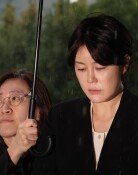Seoul to solidify coordination with Washington to end Pyongyang’s nukes
Seoul to solidify coordination with Washington to end Pyongyang’s nukes
Posted March. 15, 2018 08:14,
Updated March. 15, 2018 08:14
An official at the South Korean president office Cheong Wa Dae projected Wednesday that the resolution of the North Korean nuclear issue could be achieved in a way that severing a bigger chain automatically addresses other smaller issues. The remark was made in a response to a question on Cheong Wa Dae’s position on various ideas coming from inside and outside of the government, including discussing at the upcoming inter-Korean summit ways to declare an official end to the Korean War and signing a peace treaty, or linking the denuclearization process to easing sanctions on the North. Comparing the North Korea nuclear issue to the “Gordian Knot,” or an extremely intricate problem, the official indicated that Seoul would take a bold approach of cutting the knot at one stroke, rather than untangling it little by little.
A bold and creative approach is necessary in order to resolve such a long conundrum of the North Korean nuclear issue. As the supreme leaders of the two countries meet, any agenda can be put on the summit table, and it is possible to reach a comprehensive agreement. Such an idea was discussed and sought for in the past as well. The 2007 inter-Korean summit agreement also included the issue of leaders of the two Koreas, the United States and possibly China getting together to declare an official end to the Korean War. The 2000 North Korea-U.S. joint communique also mentioned various ways to put an official end to the war. However, all the ideas went nowhere due to the North’s failure to keep its denuclearization promise, which was the precondition for everything else.
Through the inter-Korean summit in April and the North Korea-U.S. summit in May, Seoul seems to be seeking to reach a grand agreement that would simultaneously accomplish the completion of Pyongyang’s denuclearization, the proposed peace treaty, and the diplomatic normalization between the U.S. and North Korea. It is also in line with China’s call for the simultaneous pursuit of denuclearization and peace talks with North Korea. However, Seoul should also look back on the past, in which all the agreements broke down during the process of verifying Pyongyang’s implementation of its denuclearization. Just as “carrots” to motivate the North’s complete denuclearization is important, there needs to be “sticks” with which to press the North to keep its promise. Still, there are questions as to whether Seoul is preparing such measures.
The United States is already indicating tough negotiations with the North. U.S. President Donald Trump fired his Secretary of State Rex Tillerson on Tuesday and named CIA Director Mike Pompeo as the new state secretary. Pompeo, who played a leading role behind the decision to hold North Korea-U.S. summit, is hawkish on North Korea who once indicated ousting the Kim Jong Un regime. Putting such a hardline figure at the front, President Trump expected “very positive” results to come out at the upcoming summit with Kim Jong Un, sending a clear message that he would seek satisfactory results while maintaining his maximum pressures on Pyongyang.
No matter what type of agreement is reached between the two Koreas, they would go down the drain without U.S. consent. North Korea would get away from such an agreement, leaving all the burdens on the South’s shoulders. The priority of the upcoming inter-Korean summit should be placed on reaffirming Pyongyang’s commitment to its denuclearization and getting its implementation promise. Only then can an irreversible agreement be reached at the North Korea-U.S. summit. This is why close policy coordination between Seoul and Washington is more important than ever.
Headline News
- N. Korea redefines S. Korea as ‘hostile state’ in revised constitution
- Samsung develops graphic DRAM with industry-leading capacity and speed
- Three questions allegedly leaked via text message during Yonsei Univ. essay test
- China to inject 340 trillion won in loans to support real estate sector
- Dodgers beat Mets to take 2-1 lead in NLCS







